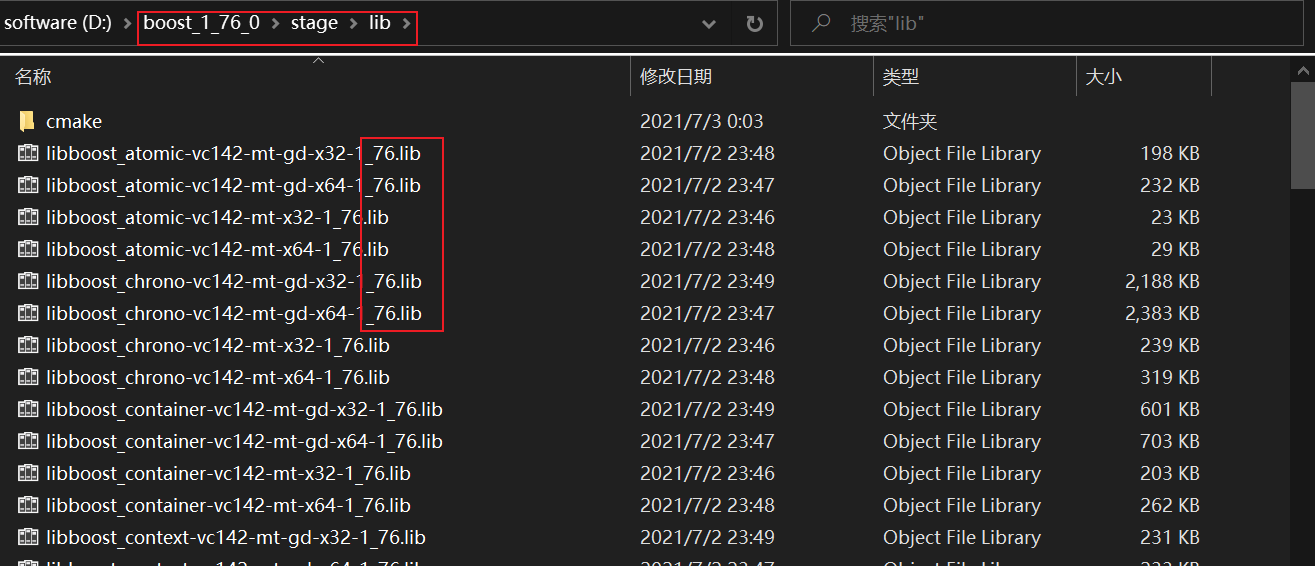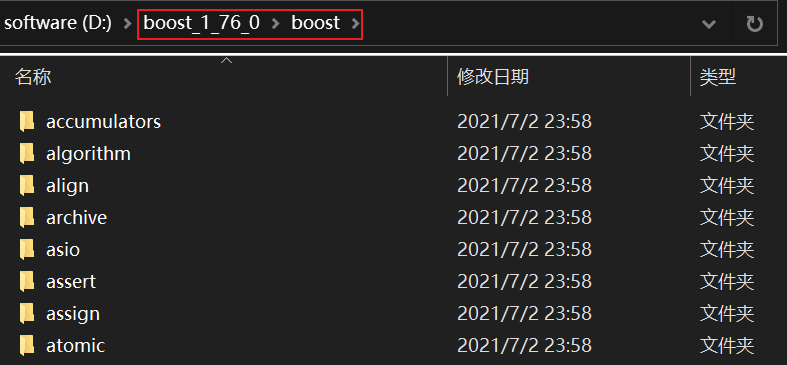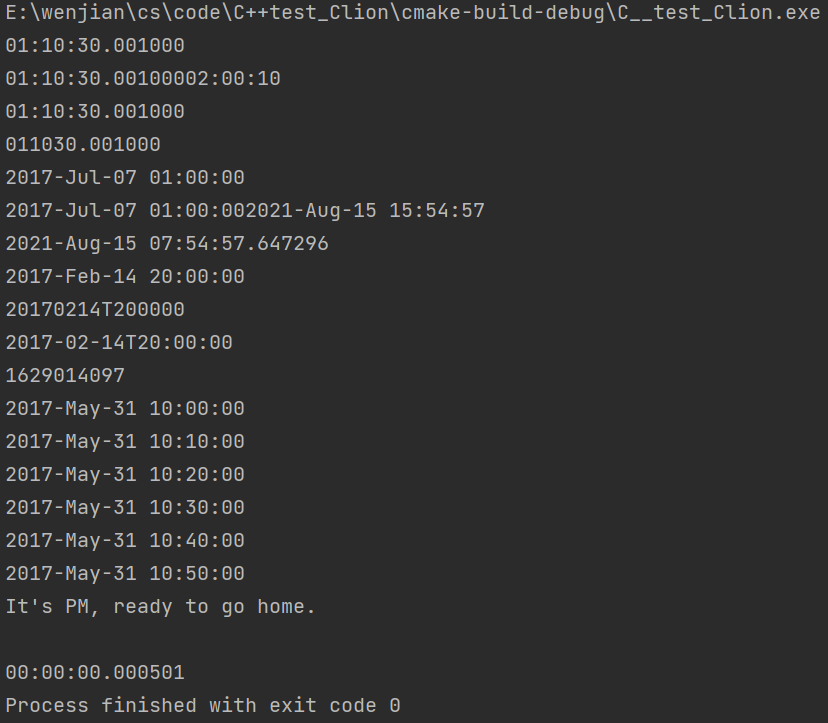文章目录
一、前言
之前写了两篇关于在linux上安装boost和在Windows上使用boost的文章
下面就该开始使用boost了,boost包含的内容特别多,初学时我们肯定摸不着头脑,不知道从哪里开始学习比较好。
从我个人的看法,刚开始学习boost可以先找几个简单的模块用用,等熟悉了boost的一些基本概念和使用方法,后面就可以针对性的学习自己要用的模块。
二、boost基本概念
boost在安转完之后的目录结构如下图所示:

boost的模块都是以.hpp文件形式存在,即在一个文件中包括了函数变量的声明和定义,因此大部分boost模块我们可以直接包含使用,对于少部分模块我们需要编译成库文件使用。编译好的库文件存放在目录stage/lib里面

其余的.hpp文件都在boost目录下

因此我们要使用boost,最重要的就是boost目录和stage/lib目录,分别存放在 .hpp文件和 .lib文件。
在linux上使用即把boost目录加入到头文件查找目录,把stage/lib加入到库文件查找目录。
在Windows下,即在IDE软件中加入boost头文件查找目录,加入stage/lib到库文件查找目录,这个在之前的博客中已经讲了怎么操作,不知道的可以看看上面的博客。
三、日期与时间
1.timer
timer可以测量时间的流逝,是一个小型的计时器,可提供毫秒级别的计时精度和操作函数,供程序员手工控制使用,它就像个秒表。
直接看源代码,再来讲解
// boost timer.hpp header file ---------------------------------------------//
// Copyright Beman Dawes 1994-99. Distributed under the Boost
// Software License, Version 1.0. (See accompanying file
// LICENSE_1_0.txt or copy at http://www.boost.org/LICENSE_1_0.txt)
// See http://www.boost.org/libs/timer for documentation.
// Revision History
// 01 Apr 01 Modified to use new <boost/limits.hpp> header. (JMaddock)
// 12 Jan 01 Change to inline implementation to allow use without library
// builds. See docs for more rationale. (Beman Dawes)
// 25 Sep 99 elapsed_max() and elapsed_min() added (John Maddock)
// 16 Jul 99 Second beta
// 6 Jul 99 Initial boost version
#ifndef BOOST_TIMER_HPP
#define BOOST_TIMER_HPP
#include <boost/config/header_deprecated.hpp>
BOOST_HEADER_DEPRECATED( "the facilities in <boost/timer/timer.hpp>" )
#include <boost/config.hpp>
#include <ctime>
#include <boost/limits.hpp>
# ifdef BOOST_NO_STDC_NAMESPACE
namespace std { using ::clock_t; using ::clock; }
# endif
namespace boost {
// timer -------------------------------------------------------------------//
// A timer object measures elapsed time.
// It is recommended that implementations measure wall clock rather than CPU
// time since the intended use is performance measurement on systems where
// total elapsed time is more important than just process or CPU time.
// Warnings: The maximum measurable elapsed time may well be only 596.5+ hours
// due to implementation limitations. The accuracy of timings depends on the
// accuracy of timing information provided by the underlying platform, and
// this varies a great deal from platform to platform.
class timer
{
public:
timer() { _start_time = std::clock(); } // postcondition: elapsed()==0
// timer( const timer& src ); // post: elapsed()==src.elapsed()
// ~timer(){}
// timer& operator=( const timer& src ); // post: elapsed()==src.elapsed()
void restart() { _start_time = std::clock(); } // post: elapsed()==0
double elapsed() const // return elapsed time in seconds
{ return double(std::clock() - _start_time) / CLOCKS_PER_SEC; }
double elapsed_max() const // return estimated maximum value for elapsed()
// Portability warning: elapsed_max() may return too high a value on systems
// where std::clock_t overflows or resets at surprising values.
{
return (double((std::numeric_limits<std::clock_t>::max)())
- double(_start_time)) / double(CLOCKS_PER_SEC);
}
double elapsed_min() const // return minimum value for elapsed()
{ return double(1)/double(CLOCKS_PER_SEC); }
private:
std::clock_t _start_time;
}; // timer
} // namespace boost
#endif // BOOST_TIMER_HPP
- timer模块需要依赖下面三个文件
#include <boost/config.hpp>
#include <ctime>
#include <boost/limits.hpp>
- timer模块存在于命名空间namespace boost
- timer模块的主类为timer,包含1个构造函数,4个成员函数,1个成员变量
可以看出timer模块是非常简单的,当然我们刚开始学习一些简单的模块可以帮助我们建立一些使用boost的基础,让我们更快的上手,不失为一个好的选择。
下面我们用一点代码来简单使用一下timer模块
#include <iostream>
using namespace std;
#include <boost/timer.hpp>
using namespace boost;
int main()
{
timer t; //定义一个timer对象,通过该对象进行时间的相应操作
cout << CLOCKS_PER_SEC << endl;
cout << "max timespan:"
<< t.elapsed_max() /3600 << "h" <<endl;
cout << "min timespan:"
<< t.elapsed_min() << "s" << endl;
cout << "now time elapsed:"
<< t.elapsed() <<"s" << endl;
}
2.progress_timer
progress_timer也是一个计时器,它派生自timer,会在析构时自动输出时间,省去了timer手动调用elapsed()的工作,是一个相当方便的自动计时的小工具。
progress_timer位于命名空间boost,需要包含的头文件如下
#include <boost/progress.hpp>
using namespace boost;
先看progress_timer的源码
// boost progress.hpp header file ------------------------------------------//
// Copyright Beman Dawes 1994-99. Distributed under the Boost
// Software License, Version 1.0. (See accompanying file
// LICENSE_1_0.txt or copy at http://www.boost.org/LICENSE_1_0.txt)
// See http://www.boost.org/libs/timer for documentation.
// Revision History
// 1 Dec 01 Add leading progress display strings (suggested by Toon Knapen)
// 20 May 01 Introduce several static_casts<> to eliminate warning messages
// (Fixed by Beman, reported by Herve Bronnimann)
// 12 Jan 01 Change to inline implementation to allow use without library
// builds. See docs for more rationale. (Beman Dawes)
// 22 Jul 99 Name changed to .hpp
// 16 Jul 99 Second beta
// 6 Jul 99 Initial boost version
#ifndef BOOST_PROGRESS_HPP
#define BOOST_PROGRESS_HPP
#include <boost/config/header_deprecated.hpp>
BOOST_HEADER_DEPRECATED( "the facilities in <boost/timer/timer.hpp> or <boost/timer/progress_display.hpp>" )
#include <boost/timer.hpp>
#include <boost/noncopyable.hpp>
#include <boost/cstdint.hpp> // for uintmax_t
#include <iostream> // for ostream, cout, etc
#include <string> // for string
namespace boost {
// progress_timer ----------------------------------------------------------//
// A progress_timer behaves like a timer except that the destructor displays
// an elapsed time message at an appropriate place in an appropriate form.
class progress_timer : public timer, private noncopyable
{
public:
explicit progress_timer( std::ostream & os = std::cout )
// os is hint; implementation may ignore, particularly in embedded systems
: timer(), noncopyable(), m_os(os) {}
~progress_timer()
{
// A) Throwing an exception from a destructor is a Bad Thing.
// B) The progress_timer destructor does output which may throw.
// C) A progress_timer is usually not critical to the application.
// Therefore, wrap the I/O in a try block, catch and ignore all exceptions.
try
{
// use istream instead of ios_base to workaround GNU problem (Greg Chicares)
std::istream::fmtflags old_flags = m_os.setf( std::istream::fixed,
std::istream::floatfield );
std::streamsize old_prec = m_os.precision( 2 );
m_os << elapsed() << " s\n" // "s" is System International d'Unites std
<< std::endl;
m_os.flags( old_flags );
m_os.precision( old_prec );
}
catch (...) {} // eat any exceptions
} // ~progress_timer
private:
std::ostream & m_os;
};
// progress_display --------------------------------------------------------//
// progress_display displays an appropriate indication of
// progress at an appropriate place in an appropriate form.
// NOTE: (Jan 12, 2001) Tried to change unsigned long to boost::uintmax_t, but
// found some compilers couldn't handle the required conversion to double.
// Reverted to unsigned long until the compilers catch up.
class progress_display : private noncopyable
{
public:
explicit progress_display( unsigned long expected_count_,
std::ostream & os = std::cout,
const std::string & s1 = "\n", //leading strings
const std::string & s2 = "",
const std::string & s3 = "" )
// os is hint; implementation may ignore, particularly in embedded systems
: noncopyable(), m_os(os), m_s1(s1), m_s2(s2), m_s3(s3) { restart(expected_count_); }
void restart( unsigned long expected_count_ )
// Effects: display appropriate scale
// Postconditions: count()==0, expected_count()==expected_count_
{
_count = _next_tic_count = _tic = 0;
_expected_count = expected_count_;
m_os << m_s1 << "0% 10 20 30 40 50 60 70 80 90 100%\n"
<< m_s2 << "|----|----|----|----|----|----|----|----|----|----|"
<< std::endl // endl implies flush, which ensures display
<< m_s3;
if ( !_expected_count ) _expected_count = 1; // prevent divide by zero
} // restart
unsigned long operator+=( unsigned long increment )
// Effects: Display appropriate progress tic if needed.
// Postconditions: count()== original count() + increment
// Returns: count().
{
if ( (_count += increment) >= _next_tic_count ) { display_tic(); }
return _count;
}
unsigned long operator++() { return operator+=( 1 ); }
unsigned long count() const { return _count; }
unsigned long expected_count() const { return _expected_count; }
private:
std::ostream & m_os; // may not be present in all imps
const std::string m_s1; // string is more general, safer than
const std::string m_s2; // const char *, and efficiency or size are
const std::string m_s3; // not issues
unsigned long _count, _expected_count, _next_tic_count;
unsigned int _tic;
void display_tic()
{
// use of floating point ensures that both large and small counts
// work correctly. static_cast<>() is also used several places
// to suppress spurious compiler warnings.
unsigned int tics_needed = static_cast<unsigned int>((static_cast<double>(_count)
/ static_cast<double>(_expected_count)) * 50.0);
do { m_os << '*' << std::flush; } while ( ++_tic < tics_needed );
_next_tic_count =
static_cast<unsigned long>((_tic/50.0) * static_cast<double>(_expected_count));
if ( _count == _expected_count ) {
if ( _tic < 51 ) m_os << '*';
m_os << std::endl;
}
} // display_tic
};
} // namespace boost
#endif // BOOST_PROGRESS_HPP
3.data_time库
data_time库需要编译才能使用,data_time库包括两个部分,处理日期的gregorian,处理时间的posix_time,它们各自需要包含的头文件如下:
//处理日期的组件
#include <boost/date_time/gregorian/gregorian.hpp>
using namespace boost::gregorian
//处理时间的组件
#include <boost/date_time/posix_time/posix_time.hpp>
using namespace boost::posix_time
3.1gregorian
用下面一段代码来测试一下这个模块
#include <iostream>
using namespace std;
//#define DATE_TIME_NO_DEFAULT_CONSTRUCTOR
#include <boost/date_time/gregorian/gregorian.hpp>
using namespace boost::gregorian;
//
void case1()
{
date d1;
date d2(2010,1,1);
date d3(2000, Jan , 1);
date d4(d2);
assert(d1 == date(not_a_date_time));
assert(d2 == d4);
assert(d3 < d4);
}
//
void case2()
{
date d1 = from_string("1999-12-31");
date d2 ( from_string("2015/1/1") );
date d3 = from_undelimited_string("20011118") ;
cout << d1 << d2 << d3 << endl;
cout << day_clock::local_day() << endl;
cout << day_clock::universal_day() << endl;
}
//
void case3()
{
date d1(neg_infin);
date d2(pos_infin);
date d3(not_a_date_time);
date d4(max_date_time);
date d5(min_date_time);
cout << d1 << d2 << d3 << d4 << d5 << endl;
try
{
//date d1(1399,12,1);
//date d2(10000,1,1);
date d3(2017,2,29);
}
catch(std::exception& e)
{
cout << e.what() << endl;
}
}
//
void case4()
{
date d(2017,6,1);
assert(d.year() == 2017);
assert(d.month() == 6);
assert(d.day() == 1);
date::ymd_type ymd = d.year_month_day();
assert(ymd.year == 2017);
assert(ymd.month == 6);
assert(ymd.day == 1);
cout << d.day_of_week() << endl;
cout << d.day_of_year() << endl;
assert(d.end_of_month() == date(2017,6,30));
cout << date(2015,1,10).week_number() << endl;
cout << date(2016,1,10).week_number() << endl;
cout << date(2017,1,10).week_number() << endl;
assert(date(pos_infin).is_infinity() );
assert(date(pos_infin).is_pos_infinity() );
assert(date(neg_infin).is_neg_infinity() );
assert(date(not_a_date_time).is_not_a_date() );
assert(date(not_a_date_time).is_special() );
assert(!date(2017,5,31).is_special() );
}
//
void case5()
{
date d(2017,1,23);
cout << to_simple_string(d) << endl;
cout << to_iso_string(d) << endl;
cout << to_iso_extended_string(d) << endl;
cout << d << endl;
//cout << "input date:";
//cin >>d;
//cout << d;
}
//
void case6()
{
date d(2017,5,20);
tm t = to_tm(d);
assert(t.tm_hour == 0 && t.tm_min == 0);
assert(t.tm_year == 117 && t.tm_mday == 20);
date d2 = date_from_tm(t);
assert(d == d2);
}
//
void case7()
{
days dd1(10), dd2(-100), dd3(255);
assert( dd1 > dd2 && dd1 < dd3);
assert( dd1 + dd2 == days(-90));
assert((dd1 + dd3).days() == 265);
assert( dd3 / 5 == days(51));
weeks w(3);
assert(w.days() == 21);
months m(5);
years y(2);
months m2 = y + m;
assert(m2.number_of_months() == 29);
assert((y * 2).number_of_years() == 4);
}
//
void case8()
{
date d1(2000,1,1),d2(2017,11,18);
cout << d2 - d1 << endl;
assert(d1 + (d2 - d1) == d2);
d1 += days(10);
assert(d1.day() == 11);
d1 += months(2);
assert(d1.month() == 3 && d1.day() == 11);
d1 -= weeks(1);
assert(d1.day() == 4);
d2 -= years(10);
assert(d2.year() == d1.year() + 7);
{
date d1(2017,1,1);
date d2 = d1 + days(pos_infin);
assert(d2.is_pos_infinity());
d2 = d1 + days(not_a_date_time);
assert(d2.is_not_a_date());
d2 = date(neg_infin);
days dd = d1 - d2;
assert(dd.is_special() && !dd.is_negative());
}
{
date d(2017,3,30);
d -= months(1);
d -= months(1);
d += months(2);
assert(d.day() == 31);
}
}
//
void case9()
{
date_period dp1(date(2017,1,1), days(20));
date_period dp2(date(2017,1,1), date(2016,1,1));
date_period dp3(date(2017,3,1), days(-20));
date_period dp(date(2017,1,1), days(20));
assert(!dp.is_null());
assert(dp.begin().day() == 1);
assert(dp.last().day() == 20);
assert(dp.end().day() == 21);
assert(dp.length().days() == 20);
{
date_period dp1(date(2017,1,1), days(20));
date_period dp2(date(2017,2,19), days(10));
cout << dp1; //[2010-Jan-01/2010-Jan-20]
assert(dp1 < dp2);
}
}
//
int main()
{
case1();
case2();
case3();
case4();
case5();
case6();
case7();
case8();
case9();
}
3.2date_period
data_time库使用date_period来表示日期区间的概念,它是时间轴上的一个左闭右开的区间,其端点是两个date对象。日期区间的左边界必须小于右边界,否则date_period将表示一个无效的日期区间。
date_period的类摘要如下:
class date_period
{
public:
period(date, date);
period(date, days);
date begin() const;
date end() const;
date last() const;
days length() const;
bool is_null() const;
bool operator==(const period &) const;
bool operator<(const period &) const;
void shift(const days &);
void expand(const days &);
bool contains(const date &) const;
bool contains(const period &) const;
bool intersects(const period &) const;
bool is_adjacent(const period &) const;
bool is_before(const date &) const;
bool is_after(const date &) const;
period intersection(const date &) const;
period merge(const period &) const;
period span(const period &) const;
};
用一段代码来测试一下
#include <iostream>
using namespace std;
#include <boost/date_time/gregorian/gregorian.hpp>
using namespace boost::gregorian;
//
void case1()
{
date_period dp(date(2017,1,1), days(20));
dp.shift(days(3));
assert(dp.begin().day() == 4);
assert(dp.length().days() == 20);
dp.expand(days(3));
assert(dp.begin().day() == 1);
assert(dp.length().days() == 26);
}
//
void case2()
{
date_period dp(date(2010,1,1), days(20));
assert(dp.is_after(date(2009,12,1)));
assert(dp.is_before(date(2010,2,1)));
assert(dp.contains(date(2010,1,10)));
date_period dp2(date(2010,1,5), days(10));
assert(dp.contains(dp2));
assert(dp.intersects(dp2));
assert(dp.intersection(dp2) == dp2);
date_period dp3(date(2010,1,21), days(5));
assert(!dp3.intersects(dp2));
assert(dp3.intersection(dp2).is_null());
assert(dp.is_adjacent(dp3));
assert(!dp.intersects(dp3));
}
//
void case3()
{
date_period dp1(date(2010,1,1), days(20));
date_period dp2(date(2010,1,5), days(10));
date_period dp3(date(2010,2,1), days(5));
date_period dp4(date(2010,1,15), days(10));
assert( dp1.contains(dp2) && dp1.merge(dp2) == dp1);
assert(!dp1.intersects(dp3) && dp1.merge(dp3).is_null());
assert( dp1.intersects(dp2) && dp1.merge(dp4).end() == dp4.end());
assert( dp1.span(dp3).end() == dp3.end());
}
//
void case4()
{
date d(2007,9,28);
day_iterator d_iter(d);
assert(d_iter == d);
++d_iter;
assert(d_iter == date(2007,9,29));
year_iterator y_iter(*d_iter, 10);
assert(y_iter == d + days(1));
++y_iter;
assert(y_iter->year() == 2017);
day_iterator iter(day_clock::local_day());
++iter;
//iter += 5;
//std::advance(iter, 5);
}
//
void case5()
{
typedef gregorian_calendar gre_cal;
cout << "Y2017 is "
<< (gre_cal::is_leap_year(2017)?"":"not")
<< " a leap year." << endl;
assert(gre_cal::end_of_month_day(2017, 2) == 28);
}
//
void case6()
{
date d(2017,1,23);
date d_start(d.year(), d.month(), 1);
date d_end = d.end_of_month();
for(day_iterator d_iter(d_start);
d_iter <= d_end; ++d_iter)
{
cout << *d_iter << " " <<
d_iter->day_of_week()<< endl;
}
}
//
void case7()
{
date d(2017,1,23);
date d18years = d + years(18);
cout << d18years << " is "
<< d18years.day_of_week()<< endl;
int count = 0;
for (day_iterator d_iter(date(d18years.year(),1,1));
d_iter <= d18years.end_of_month(); ++d_iter)
{
if (d_iter->day_of_week() == Sunday)
{
++count;
}
}
cout << "total " << count << " Sundays." << endl;
count = 0;
for (month_iterator m_iter(date(d18years.year(),1,1));
m_iter < date(d18years.year() + 1 ,1, 1); ++m_iter)
{
count += m_iter->end_of_month().day();
}
cout << "total " << count << " days of year." << endl;
}
//
class credit_card
{
public:
string bank_name;
int bill_day_no;
credit_card(const char* bname, int no):
bank_name(bname), bill_day_no(no){}
int calc_free_days(date consume_day = day_clock::local_day()) const
{
date bill_day(consume_day.year(), consume_day.month(), bill_day_no);
if (consume_day > bill_day)
{
bill_day += months(1);
}
return (bill_day - consume_day).days() + 20;
}
friend bool operator<(const credit_card& l, const credit_card& r)
{
return l.calc_free_days() < r.calc_free_days();
}
};
void case8()
{
credit_card a("A bank", 25);
credit_card b("B bank", 12);
credit_card tmp = std::max(a, b);
cout << "You should use " << tmp.bank_name
<< ", free days = " << tmp.calc_free_days() << endl;
}
int main()
{
case1();
case2();
case3();
case4();
case5();
case6();
case7();
case8();
}
4.posix_time
date_time库的时间功能位于命名空间boost::posix_time,需要包含的头文件如下
#include <boost/date_time/posix_time/posix_time.hpp>
using namespace boost::posix_time;
从概念上来说,时间是日期的进一步细化,相当于在日期”天“的量级之下增加了”时分秒“的概念
直接上测试代码
#include <iostream>
using namespace std;
//#define BOOST_DATE_TIME_POSIX_TIME_STD_CONFIG
#include <boost/date_time/gregorian/gregorian.hpp>
using namespace boost::gregorian;
#include <boost/date_time/posix_time/posix_time.hpp>
using namespace boost::posix_time;
//
void case1()
{
{
time_duration td = duration_from_string("1:10:30:001");
cout << td << endl;
time_duration td1(1,10,30,1000);
time_duration td2(1,60,60,1000*1000* 6 + 1000);
}
hours h(1);
minutes m(10);
seconds s(30);
millisec ms(1);
time_duration td = h + m + s + ms;
time_duration td2 = hours(2) + seconds(10);
cout << td << td2 << endl;
}
//
void case2()
{
time_duration td(1,10,30,1000);
assert(td.hours() == 1 && td.minutes() == 10 && td.seconds() == 30);
assert(td.total_seconds() == 1*3600+ 10*60 + 30);
#ifndef BOOST_DATE_TIME_POSIX_TIME_STD_CONFIG
assert(td.total_milliseconds() == td.total_seconds()*1000 + 1);
assert(td.fractional_seconds() == 1000);
#endif
hours h(-10);
assert(h.is_negative());
time_duration h2 = h.invert_sign();
assert(!h2.is_negative() && h2.hours() == 10);
time_duration td1(not_a_date_time);
assert(td1.is_special() && td1.is_not_a_date_time());
time_duration td2(neg_infin);
assert(td2.is_negative() && td2.is_neg_infinity());
}
//
void case3()
{
time_duration td1 = hours(1);
time_duration td2 = hours(2) + minutes(30);
assert(td1 < td2);
assert((td1+td2).hours() == 3);
assert((td1-td2).is_negative());
assert(td1 * 5 == td2 * 2);
assert((td1/2).minutes() == td2.minutes());
time_duration td(1,10,30,1000);
cout << to_simple_string(td) << endl;
cout << to_iso_string(td) << endl;
}
//
void case4()
{
#ifdef BOOST_DATE_TIME_POSIX_TIME_STD_CONFIG
time_duration td(1,10,30,1000);
cout << td;
assert(td.total_milliseconds() ==
td.total_seconds()*1000);
assert(td.fractional_seconds() ==1000);
assert(time_duration::unit()*1000*1000*1000 == seconds(1));
assert(td.resolution() == boost::date_time::nano);
assert(td.num_fractional_digits() == 9);
#endif
}
//
void case5()
{
ptime p(date(2017,7,7), hours(1));
ptime p1 = time_from_string("2017-7-7 01:00:00");
ptime p2 = from_iso_string("20170707T010000");
cout << p1 << endl << p2;
{
ptime p1 = second_clock::local_time();
ptime p2 = microsec_clock::universal_time();
cout << p1 << endl << p2;
}
}
//
void case6()
{
ptime p(date(2010,3,20), hours(12)+minutes(30));
date d = p.date();
time_duration td = p.time_of_day();
assert(d.month() == 3 && d.day() == 20);
assert(td.total_seconds() == 12*3600 + 30*60);
ptime p1(date(2010,3,20), hours(12)+minutes(30));
ptime p2 = p1 + hours(3);
assert(p1 < p2);
assert(p2 - p1 == hours(3));
p2 += months(1);
assert(p2.date().month() == 4);
cout << endl;
{
ptime p(date(2017,2,14), hours(20));
cout << to_simple_string(p) << endl;
cout << to_iso_string(p) << endl;
cout << to_iso_extended_string(p) << endl;
}
}
//
void case7()
{
ptime p(date(2017,5,20), hours(14));
tm t = to_tm(p);
assert(t.tm_year == 117 && t.tm_hour == 14);
assert(ptime_from_tm(t) == p);
ptime p2 = from_time_t(std::time(0));
assert(p2.date() == day_clock::local_day());
cout << to_time_t(p2) << endl;
}
//
void case8()
{
ptime p(date(2017,1,1),hours(12)) ;
time_period tp1(p, hours(8));
time_period tp2(p + hours(8), hours(1));
assert(tp1.end() == tp2.begin() && tp1.is_adjacent(tp2));
assert(!tp1.intersects(tp2));
tp1.shift(hours(1));
assert(tp1.is_after(p));
assert(tp1.intersects(tp2));
tp2.expand(hours(10));
assert(tp2.contains(p) && tp2.contains(tp1));
}
//
void case9()
{
ptime p(date(2017,5,31),hours(10)) ;
for (time_iterator t_iter(p, minutes(10));
t_iter < p + hours(1); ++ t_iter)
{
cout << *t_iter << endl;
}
}
//
template<typename Clock = microsec_clock>
class basic_ptimer
{
public:
basic_ptimer()
{ restart();}
void restart()
{ _start_time = Clock::local_time(); }
void elapsed() const
{ cout << Clock::local_time() - _start_time; }
~basic_ptimer()
{ elapsed(); }
private:
ptime _start_time;
};
typedef basic_ptimer<microsec_clock> ptimer;
typedef basic_ptimer<second_clock> sptimer;
class work_time
{
public:
typedef map<time_period, string> map_t;
private:
map_t map_ts;
void init()
{
ptime p(day_clock::local_day());
map_ts[time_period(p, hours(9))] = "It's too early, just relax.\n";
p += hours(9);
map_ts[time_period(p, hours(3)+ minutes(30))] = "It's AM, please work hard.\n";
p += hours(3)+ minutes(30);
map_ts[time_period(p, hours(1))] = "It's lunch time, are you hungry?\n";
p += hours(1);
map_ts[time_period(p, hours(4)+minutes(30))] = "It's PM, ready to go home.\n";
p += hours(4)+ minutes(30);
map_ts[time_period(p, hours(6))] = "Are you still working? you do need a rest.\n";
}
public:
work_time()
{ init(); }
void greeting(const ptime& t)
{
for (auto& x : map_ts)
{
if (x.first.contains(t))
{
cout << x.second << endl;
break;
}
}
}
};
void case10()
{
ptimer t;
work_time wt;
wt.greeting(second_clock::local_time());
}
//
int main()
{
case1();
case2();
case3();
case4();
case5();
case6();
case7();
case8();
case9();
case10();
}
运行结果如下:
